| Chairman of the Standing Committee of the National People's Congress | |
|---|---|
| 全国人民代表大会常务委员会委员长 | |
.svg.png.webp) | |
 | |
| Standing Committee of the National People's Congress | |
| Type | Presiding officer |
| Member of | Council of Chairpersons |
| Nominator | Presidium of the National People's Congress |
| Appointer | National People's Congress |
| Term length | 5 years, renewable once consecutively |
| Constituting instrument | Constitution of China |
| Formation | 27 September 1954 |
| First holder | Liu Shaoqi |
| Deputy | Vice Chairpersons |
| Salary | CN¥150,000 per annum est. (2015)[1] |
| Website | www.npc.gov.cn |
| Chairman of the Standing Committee of the National People's Congress | |||||||
|---|---|---|---|---|---|---|---|
| Simplified Chinese | 全国人民代表大会常务委员会委员长 | ||||||
| Traditional Chinese | 全國人民代表大會常務委員會委員長 | ||||||
| |||||||
| Officially abbreviated as | |||||||
| Simplified Chinese | 全国人大常委会委员长 | ||||||
| Traditional Chinese | 全國人大常委會委員長 | ||||||
| |||||||
.svg.png.webp) |
|---|
|
|
The chairman of the Standing Committee of the National People's Congress is the presiding officer of the Standing Committee of the National People's Congress (NPCSC), which is the permanent body of the National People's Congress (NPC), the national legislature of China.
The chairman is formally nominated by the Presidium of the NPC during a session and approved by the delegations of the NPC, though in reality is chosen within the ruling Chinese Communist Party (CCP).[2] The chairman presides over the work of the NPCSC and convenes and presides over its meetings. The chairman is assisted by the vice chairpersons and secretary-general of the NPCSC, who together makeup the Council of Chairpersons.[3] A vice chairperson may be delegated to exercise some of the chairman's powers by the chairman. In the case that the chairman becomes incapacitated, NPCSC temporarily elects one of the vice chairpersons until the chairman is able to resume their work or a new chairman is elected by the NPC.[4] The position holds reserve constitutional powers under the 1982 revision of the Constitution of the People's Republic of China. As stipulated in Article 84 of the Constitution, should both the president and vice president become incapacitated, and the National People's Congress is unable to elect a timely replacement, the chairman of the NPCSC will act as president.[4]
From 1998 to 2013, the position was ranked second in the hierarchy of the Politburo Standing Committee of the CCP, since Li Peng was barred from seeking a third term as premier in 1998. In the political order of precedence, the chairman ranks below the CCP general secretary (paramount leader) and president (state representative).[5] The ranking of this position is not necessarily reflective of its actual power, which varies depending on the officeholder. The incumbent chairman is Zhao Leji, who is the third-ranking member of the Politburo Standing Committee.
History
Initially, there were disagreements to whether name the post "chairman" (委员长 or 主席) or "speaker" (议长). However, ultimately the word "chairman" (委员长) was adopted.[6] The office came into existence with the adoption of the 1954 Constitution, with Liu Shaoqi becoming its first holder.[6]
From 1975 to 1983, the chairman of the Standing Committee served as state representative of the People's Republic of China, as the presidency had been written out of the 1975 constitution and was also excluded from the 1978 draft.[7] Theoretically, during the 1989 Tiananmen Square protests, the officeholder at the time, Wan Li, had the power to call an emergency session of the NPC to resolve the issue constitutionally. However, Wan's freedom of movement was restricted, and ultimately rendered powerless in the situation.[8]
Between 1993 and 1998, the office was held by Qiao Shi, who was the third-ranking member of the Politburo Standing Committee. Qiao tried to get rid off the NPC's "rubber stamp" reputation and turn it into an institution with real power in establishing the rule of law.[9]
On 16 March 1998, Li Peng was elected the chairman of the NPCSC, replacing Qiao Shi. However, he was elected with less than 90% of the vote, with around three hundred delegates not backing him, despite the fact that he was the only candidate.[10]
List of chairpersons
Multiple terms in office, consecutive or otherwise, are listed and counted in the first column counts individuals and the second column (term number).
- Mao Zedong Administration
- Deng Xiaoping Administration
- Jiang Zemin Administration
- Hu–Wen Administration
- Xi Jinping Administration
| No. | Chairperson | NPC term | Took office | Left office | Political Party | |
|---|---|---|---|---|---|---|
| 1 | 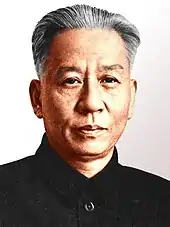 |
Liu Shaoqi 刘少奇 |
1st | September 15, 1954 | April 28, 1959 | Chinese Communist Party (CCP) |
| 2 | 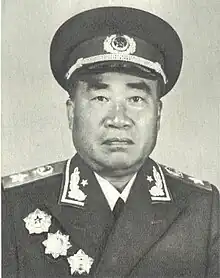 |
Zhu De 朱德 |
2nd | April 28, 1959 | January 4, 1965 | |
| 3rd | January 4, 1965 | January 17, 1975 | ||||
| 4th | January 17, 1975 | July 6, 1976 | ||||
| Office vacant July 7, 1976–March 5, 1978[lower-alpha 1] | ||||||
| 3 | 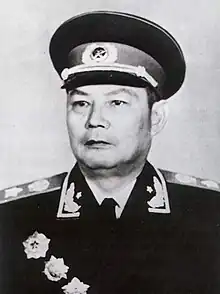 |
Ye Jianying 叶剑英 |
5th | March 5, 1978 | June 18, 1983 | Chinese Communist Party (CCP) |
| 4 | 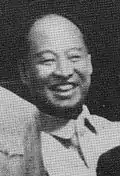 |
Peng Zhen 彭真 |
6th | June 18, 1983 | April 13, 1988 | |
| 5 | Wan Li 万里 |
7th | April 13, 1988 | March 27, 1993 | ||
| 6 | Qiao Shi 乔石 |
8th | March 27, 1993 | March 15, 1998 | ||
| 7 |  |
Li Peng 李鹏 |
9th | March 15, 1998 | March 15, 2003 | |
| 8 |  |
Wu Bangguo 吴邦国 |
10th | March 15, 2003 | March 15, 2008 | |
| 11th | March 15, 2008 | March 14, 2013 | ||||
| 9 |  |
Zhang Dejiang 张德江 |
12th | March 14, 2013 | March 17, 2018 | |
| 10 |  |
Li Zhanshu 栗战书 |
13th | March 17, 2018 | March 10, 2023 | |
| 11 | 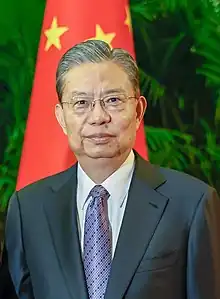 |
Zhao Leji 赵乐际 |
14th | March 10, 2023 | Incumbent | |
Timeline

Notes
- ↑ During this vacancy Soong Ching-ling performed the functions and duties of the chairperson as the first vice chairperson.
Further reading
References
- ↑ Luo, Wangshu (2015-01-20). "Public Employees Get Salary Increase". China Daily. Archived from the original on 5 June 2019. Retrieved 4 November 2019.
- ↑ Liao, Zewei (2023-03-04). "NPC 2023: How China Selects Its State Leaders for the Next Five Years". NPC Observer. Retrieved 2023-11-03.
- ↑ "FAQs: National People's Congress and Its Standing Committee". NPC Observer. 4 May 2023. Retrieved 2023-11-03.
- 1 2 "Constitution of the People's Republic of China". National People's Congress. Retrieved 2022-08-08.
- ↑ Truex 2016, p. 53.
- 1 2 "两会常识|全国人大为何设"委员长"而不是"议长"". The Paper. 4 March 2017. Retrieved 22 August 2022.
- ↑ Mackerras, McMillen & Watson 2001, p. 232.
- ↑ Truex 2016, p. 167.
- ↑ Gan, Nectar (14 June 2015). "Former China Communist Party senior official Qiao Shi dies at 91". South China Morning Post. Retrieved 8 January 2023.
- ↑ "China's parliament embarrasses Li Peng". BBC News. 16 March 1998. Retrieved 8 January 2023.